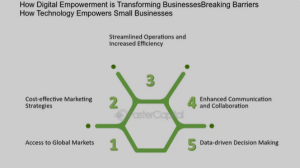Digital technologies have played a transformative role in enabling small local businesses to expand their reach and compete in the global marketplace. The adoption of digital tools has provided unprecedented opportunities for growth, efficiency, and enhanced customer engagement. The purpose of this study is to highlight ways how digital technologies is transforming small local businesses in the global marketplace.

How Digital Technologies Is Transforming Small Local Businesses In The Global Marketplace
Table of Contents
Toggle1. Online Presence and E-Commerce:
- Global Reach: Digital platforms enable small businesses to establish an online presence, reaching a global audience. E-commerce websites and platforms facilitate international sales, allowing businesses to operate beyond local boundaries.
2. Digital Marketing Strategies:
- Targeted Marketing: Digital marketing tools such as social media advertising, search engine optimization (SEO), and email marketing enable small businesses to reach specific target audiences globally, enhancing their visibility and customer acquisition efforts.
3. Mobile Apps for Business:
- Customer Engagement: Developing mobile apps allows businesses to engage with customers globally. Apps provide a convenient way for customers to access products or services, make purchases, and stay connected with the business.
4. Social Media Presence:
- Brand Building: Small businesses can leverage social media platforms to build their brand globally. Social media facilitates direct communication with customers, brand promotion, and the sharing of user-generated content.
5. Cloud Computing for Operations:
- Scalability: Cloud-based services enable small businesses to scale their operations globally without significant infrastructure investments. This includes cloud storage, collaboration tools, and software as a service (SaaS) solutions.
6. Digital Payment Solutions:
- Global Transactions: Digital payment platforms facilitate global transactions, making it easier for businesses to accept payments from customers worldwide. This enhances the accessibility of products and services for a global customer base.
7. E-Learning and Remote Work:
- Skill Development: Small businesses can utilize e-learning platforms to enhance the skills of their workforce globally. Remote work options enable access to talent irrespective of geographical boundaries.
8. Customer Relationship Management (CRM) Systems:
- Personalized Customer Service: CRM systems help businesses manage customer interactions globally. Personalized customer service, tailored marketing, and effective communication contribute to a positive customer experience.
9. Data Analytics for Decision-Making:
- Informed Decision-Making: Small businesses can harness data analytics tools to gather insights into customer behavior, market trends, and operational efficiency. Informed decision-making contributes to business growth and strategy development.
10. Global Supply Chain Integration:
- Efficient Logistics: Digital technologies facilitate the integration of global supply chains for small businesses. This includes real-time tracking, inventory management, and coordination with suppliers and distributors worldwide.
11. Virtual Collaboration Tools:
- Remote Collaboration: Virtual collaboration tools enable global teamwork and collaboration among employees, contractors, and partners. This enhances productivity and fosters innovation in a globally distributed workforce.
12. Online Reviews and Reputation Management:
- Customer Trust: Online reviews and reputation management tools contribute to building trust among global customers. Positive online feedback can attract new customers and enhance the credibility of the business.
13. Artificial Intelligence (AI) and Automation:
- Operational Efficiency: Small businesses can leverage AI and automation for tasks such as customer support, data analysis, and process automation, improving efficiency and reducing operational costs.
14. Augmented Reality (AR) and Virtual Reality (VR):
- Enhanced Customer Experience: AR and VR technologies enhance the online shopping experience for global customers. Virtual try-ons, product visualization, and interactive experiences contribute to increased customer engagement.
Conclusion:
Digital technologies have leveled the playing field for small local businesses, empowering them to compete globally. Through online presence, digital marketing, cloud-based operations, and innovative tools, small businesses can access a global customer base, optimize their operations, and thrive in the dynamic landscape of the global marketplace. Successful adoption of digital strategies allows these businesses to not only survive but also flourish in an increasingly interconnected and digital world.
